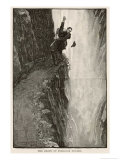If there's one piece of writing advice that I try to abide by, other than read, read, read (see post on 18.09.13) it is Do not write fiction in order to convey a Point.*
I've just abandoned Tolstoy's Resurrection, having sauntered through the first quarter, plodded through the second and slogged lamely through the third. I just had to stop; I couldn't make it any further; I was dazed and achy from being bludgeoned over the head with Tolstoy's Moral Message.
It's not that I object in principle to a novelised critique of a corrupt society, but in order to be readable the satire should, I think, emerge organically from the characters and their interactions. It shouldn't be foisted on them. It's a novel not a pamphlet; the characters are the main event, not the author's opinions. In Resurrection it's as though Tolstoy decided he couldn't be doing with all the complexities of characterisation. Prince Nekhludoff, Maslova and the rest only exist in order to illustrate his philosophy. Their thoughts, feelings, actions and conversations are insignificant except in as far as they persuade people that a non-Tolstoyan world is a disgusting world.
In Resurrection, when the Prince's potential fiancée, Missy, makes a banal remark at dinner you feel that she is doing so because she represents (along with Turkish towels, perfumed mouth wash and feather-beds) everything that's wrong with the world. That's all she's for. She's not allowed to come alive and do surprising things, so she turns out two-dimensional. In a great novel, like Anna Karenina, people aren't written off like that. Karenin, Vronsky and Anna are all alienating at times, and then at other times they're deeply lovable. You can't boil them down, put them in a nutshell or otherwise sum them up.
You can't sum up a good novel, either. The question, What's this novel about? should provoke interminable argument, not a tidy précis. One of the functions of fiction is to probe moral questions, not to close them. When he was an old man Tolstoy rejected Anna Karenina and War and Peace as 'degenerate', 'elitist', 'counterfeit art' and took to writing overtly moral works such as The Kreutzer Sonata and Resurrection. In other words he was fed up with the amoral intricacies of novel writing; fed up, as he saw it, of putting aesthetics over morals. Better, he felt, to use his literary genius to lambast all the things he hated most: sex, the government, the church, the judiciary, private property and the aristocratic way of life. I wonder why he stuck with fiction at all. It's a curious instrument to choose; rather like picking up a scalpel when you're minded to cudgel someone's brains out.
 |
| Tolstoy looking like a man with a message |
*People issuing writing advice always begin by claiming there are no hard and fast rules. They then go on to say, Oh, except for this hard and fast rule, and that one, and that one...I've now gone and done the same thing. Bother.






